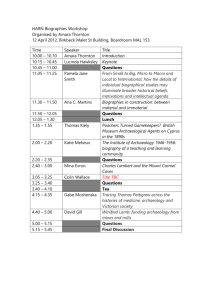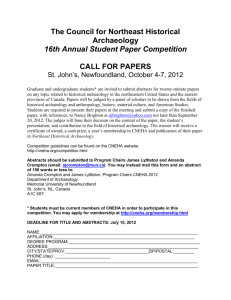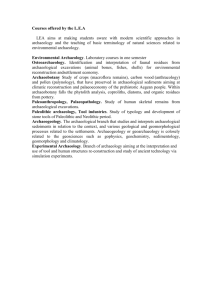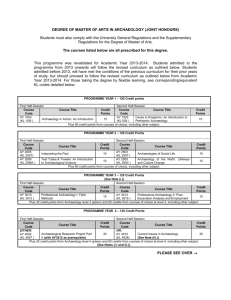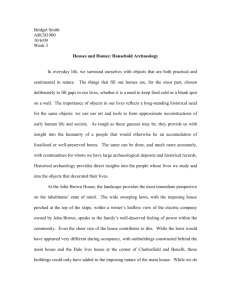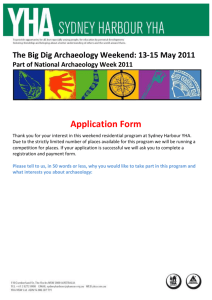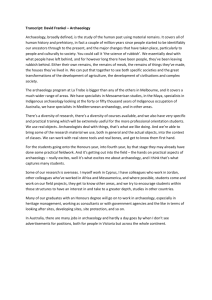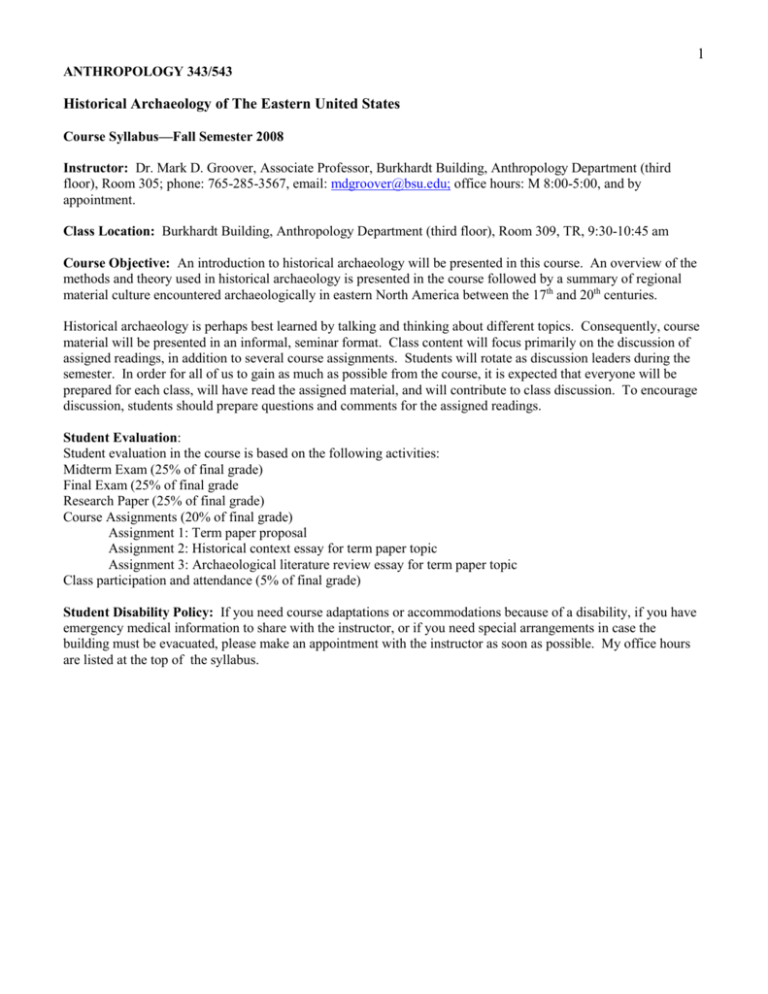
1
ANTHROPOLOGY 343/543
Historical Archaeology of The Eastern United States
Course Syllabus—Fall Semester 2008
Instructor: Dr. Mark D. Groover, Associate Professor, Burkhardt Building, Anthropology Department (third
floor), Room 305; phone: 765-285-3567, email: mdgroover@bsu.edu; office hours: M 8:00-5:00, and by
appointment.
Class Location: Burkhardt Building, Anthropology Department (third floor), Room 309, TR, 9:30-10:45 am
Course Objective: An introduction to historical archaeology will be presented in this course. An overview of the
methods and theory used in historical archaeology is presented in the course followed by a summary of regional
material culture encountered archaeologically in eastern North America between the 17th and 20th centuries.
Historical archaeology is perhaps best learned by talking and thinking about different topics. Consequently, course
material will be presented in an informal, seminar format. Class content will focus primarily on the discussion of
assigned readings, in addition to several course assignments. Students will rotate as discussion leaders during the
semester. In order for all of us to gain as much as possible from the course, it is expected that everyone will be
prepared for each class, will have read the assigned material, and will contribute to class discussion. To encourage
discussion, students should prepare questions and comments for the assigned readings.
Student Evaluation:
Student evaluation in the course is based on the following activities:
Midterm Exam (25% of final grade)
Final Exam (25% of final grade
Research Paper (25% of final grade)
Course Assignments (20% of final grade)
Assignment 1: Term paper proposal
Assignment 2: Historical context essay for term paper topic
Assignment 3: Archaeological literature review essay for term paper topic
Class participation and attendance (5% of final grade)
Student Disability Policy: If you need course adaptations or accommodations because of a disability, if you have
emergency medical information to share with the instructor, or if you need special arrangements in case the
building must be evacuated, please make an appointment with the instructor as soon as possible. My office hours
are listed at the top of the syllabus.
2
Historical Archaeology of Eastern United States
Anthropology 343/543
Fall 2008
Week 1:
Course Introduction, What is Historical Archaeology?
Aug 26, 28: Historical Archaeology: History and Definitions (Deagan 1996; Little 1996;
Orser 2004, Chapter 1)
Week 2:
Historical Archaeology: Study Topics
Sept 2: Study Topics (Orser 2004, Chapter 3)
Sept 4: Social Variables: Archaeology of Groups and Ethnicity (Orser 2004, Chapter 10)
Week 3:
Historical Archaeology: Theory
Sept 9: Theory (Leone and Potter 1988, Chapter 1; Orser 2004, Chapters 2, 9)
Sept 11: Course Themes: Eastern U. S., Medium-interval time, Culture
Continuity/Change;
Class Discussion, Social Groups: Race, Class, Gender, Ethnicity, Religion, Politics, Place
of Orign/Nationality
Week 4:
Site Questions, Methods, and Context
Sept 16: Site Structure/Landscape Reconstruction, Spatial Analysis
Sept 18: Artifact Analysis: Artifact Identification, Functional Analysis, Secondary
Analyses; Historical Context
Week 5:
Historical Archaeology of Native Americans
Sept 23, Term Paper Proposal Due
Sept 23: Native American culture continuity/change models (Rubertone 2000; Nassaney
and Johnson 2000)
Sept 25: The Cherokee in the Southeast (Schroedl 2000, Dunaway 1994)
Week 6:
Native Americans: The Northeast
Sept 30: Johnson 2000; Brenner 1988
Oct 2: Nassaney 2000; Cabak and Loring 2000
Week 7:
Native Americans: The Midwest
Oct 7: Historic Context Essay Due
Oct 7: Schurr 2006; Wagner 2006
Oct 9: Bollwerk 2006; Spector 1993
Week 8:
Exam 1 & The Colonial South
Oct 14: Exam 1
Oct 16: The Colonial South: African-American Archaeology (Singleton 1995; Ferguson
1991, 1992)
The Colonial Northeast and Mid-Atlantic
Oct 21: Deetz 1988; Leone 1988
Oct 23: Leone 2005; Cantrell and Wall 2001
Week 9:
3
Week 10:
The Colonial Midwest and Plains
Oct 28: Noble 1991; Heldman 1991
Oct 30: Martin 1991; Waselkov 1997
Week 11:
The Antebellum South
Nov 4: Plantation Research Design (Groover 2004)
Bush Hill Plantation (Cabak and Groover 2006)
Nov 6: Farmsteads (Groover 2008)
Week 12:
The Antebellum Northeast and Mid-Atlantic
Nov 11: The Lighthouse Community (Feder 1994) and Harper's Ferry (Shackel and Larsen
2000)
Nov 13: Boott Mill (Mrozowski et al. 1996; Mrosowski 1991)
and Mrs. Starr (Seifert 1994)
Week 13:
The Antebellum Midwest
Nov 18: Archaeological Literature Review Due
Nov 18: Mazrim 2007, Robinson 1994
Nov 20: Little and Shackel 2007
Week 14:
The Postbellum-Modern South
Nov 25: Rural Modernization (Cabak et al. 1999)
Nov 27: Thanksgiving Holiday
Week 15:
The Postbellum-Modern Northeast and Mid-Atlantic
Dec 2: Mullins 1999; diZerega-Wall 2000, Cantrell and Wall 2001
The Postbellum-Modern Midwest
Dec 4: The Wayman A.M.E. Church (Cabak et al. 1995)
Week 16:
In-Class Paper Presentations, Dec 9 & 11
Dec 11: Term Papers Due
Final Exam: Thursday, December 18, 9:45-11:45
4
Assigned Readings
Bollwork, Elizabeth
2006 Controlling Acculturation: A Potowatomi Strategy for Avoiding Removal.
Midcontinental Journal of Archaeology 31(1):117-141..
Brenner, Elise M.
1988 Socipolitical Implications of Mortuary Ritual Remains in 17th-Century Native Southern
New England. In The Recovery of Meaning: Historical Archaeology in the Eastern United
States, pp. 147-182. Smithsonian Institution Press, Washington, D.C.
Cabak, Melanie A. and Mark D. Groover
2006 Bush Hill: Material Life at a Working Plantation. Historical Archaeology 40(4)51-83.
Cabak, Melanie A. and Stephen Loring
2000 "A Set of Very Fair Cups and Saucers": Stamped Ceramics as an Example of Inuit
Incorporation. International Journal of Historical Archaeology 4(1):1-35.
Cabak, Melanie A., Mark D. Groover, and Mary M. Inkrot
1999 Rural Modernization During the Recent Past: Farmstead Archaeology on the Aiken
Plateau. Historical Archaeology 33(4):19-43.
Cabak, Melanie A., Mark D. Groover, and Scott J. Wagers
1995 Health Care and the Wayman AME Church. Historical Archaeology 29(2):59-76.
Cantrell, Anne-Marie and Dianna di Zerega Wall
2001 Unearthing Gotham: The Archaeology of New York City. Yale University Press, New
Haven, Connecticut.
Deagan, Kathleen
1996 Avenues of Inquiry in Historical Archaeology. In Images of the Recent Past: Readings in
Historical Archaeology, edited by Charles E. Orser, Jr., pp. 16-41. Altamira Press,
London.
Deetz, James
1988 Material Culture and Worldview in Colonial Anglo-America. In The Recovery of
Meaning: Historical Archaeology in the Eastern United States, edited by M. P. Leone and
P. B. Potter, Jr., pp. 219-233. Smithsonian Institution Press, Washington, D.C.
diZerega-Wall, Diana
2000 Family Meals and Evening Parties : Constructing Domesticity in Nineteenth-century
Middle-Class New York. In Lines That Divide: Historical Archaeologies of Race, Class,
and Gender, edited by James A. Delle, Stephen A. Mrozowski, and Robert Paynter.
University of Tennessee Press, Knoxville.
Dunaway, Wilma A.
1994 The Southern Fur Trade and the Incorporation of Southern Appalachia into the World
Economy, 1690-1763. Review of the Fernand Braudel Center 17(2):215-242.
5
Ferguson, Leland G.
1992 Uncommon Ground: Archaeology and Early African America, 1650-1800.
Smithsonian Institution Press, Washington, D.C.
Groover, Mark D.
2004 A Regionally Based Research Design for Plantation Archaeology. In Plantations Without
Pillars: Archaeology, Wealth, and Material Life at Bush Hill, Volume 1, Context and
Interpretation, Chapter 2. Savannah River Archaeological Research Papers 11.
Occasional Papers of the Savannah River Archaeological Research Program, South
Carolina Institute of Archaeology and Anthropology, University of South
Carolina, Columbia.
2008 The Archaeology of North American Farmsteads. University Press of Florida, Gainesville.
Heldman, Donald P.
1991 The French in Michigan and Beyond: An Archaeological View From Fort
Michilimackinac Toward the West. In French Colonial Archaeology: The Illinois Country
and the Western Great Lakes, edited by J. A. Walthall, pp. 201-217. University of Illinois
Press, Urbana.
Johnson, Eric S.
2000 The Politics of Pottery: Material Culture and Political Process among Algonquians of
Seventeenth-Cetnury Southern New England. In Interpretations of Native North American
Life: Material Contributions to Ethnohistory, edited by M.S. Nannaney and E.S. Johnson,
pp. 118-146. University Press of Florida, Gainesville.
Leone, Mark P.
1988 The Georgian Order as the Order of Merchant Captialism in Annapolis, Maryland. In The
Recovery of Meaning: Historical Archaeology in the Eastern United States, edited by M.
P. Leone and P. B. Potter, Jr., pp. 235-261. Smithsonian Institution Press, Washington, D.
C.
2005 The Archaeology of Liberty in an American Capital: Excavations in Annapolis.
University of California Press, Berkeley.
Leone, Mark P. and Parker B. Potter, Jr.
1988 Introduction: Issues in Historical Archaeology. In The Recovery of Meaning: Historical
Archaeology in the Eastern United States, edited by M. P. Leone and P. B. Potter, Jr., pp.
1-22. Smithsonian Institution Press, Washington, D. C.
Little, Barbara J.
1996 People With History: An Update on Historical Archaeology in the United States. In
Images of the Recent Past: Readings in Historical Archaeology, edited by Charles E.
Orser, Jr., pp. 42-78. Altamira Press, London.
Little, Barbara J. and Paul A. Shackel
2007 Archaeology as a Tool of Civic Engagement. AltaMira Press, Lanham, Maryland.
6
Martin, Terrance J.
1991 An Archaeological Perspective on Animal Exploitation Patterns at French Colonial Sites in
the Illinois Country. In French Colonial Archaeology: The Illinois Country
and the Western Great Lakes, edited by J. A. Walthall, pp. 189-200. University of Illinois
Press, Urbana.
Mazrim, Robert
2007 The Sanngamo Frontier: History and Archaeology in the Shadow of Lincoln. University
of Chicago Press, Chicago, Illinois.
Mullins, Paul R.
1999 Race and the Genteel Consumer: Class and African-American Consumption, 1850-1930.
Historical Archaeology 33(1):22-38.
Mrozowski, Stephen A.
1991 Landscapes of Inequality. In The Archaeology of Inequality, edited by R.H. McGuire and
R. Paynter, pp. 79-101. Blackwell, Oxford, United Kingdom.
Mrozowski, Stephen A., Grace M. Ziesing, and Mary C. Beaudry
1996 Living on the Boott: Historical Archaeology at the Boott Mills Boardinghouse, Lowell,
Massachusetts. University of Massachusetts Press, Amherst.
Nassaney, Michael S.
2000 Archaeology and Oral Tradition in Tandem: Interpreting Native American Ritual,
Ideology, and Gender Relations in Contact-Period Southeastern New England. In
Interpretations of Native North American Life: Material Contributions to Ethnohistory,
edited by M.S. Nannaney and E.S. Johnson, pp. 412-431. University Press of Florida,
Gainesville.
Nassaney, Michael S. and Eric S. Johnson
2000 The Contributions of Material Objects to Ethnohistory in Native North America. In
Interpretations of Native North American Life: Material Contributions to Ethnohistory,
edited by M. S. Nassaney and E. S. Johnson, pp. 1-30. University Press of Florida,
Gainesville.
Noble, Vergil E.
1991 Ouiatenon on the Ouabache: Archaeological Investigations at a Fur Trading Post on the
Wabash River. In French Colonial Archaeology: The Illinois Country and the Western
Great Lakes, edited by J. A. Walthall, pp. 65-77. University of Illinois Press, Urbana.
Orser, Charles E., Jr.
2004 Historical Archaeology. Pearson/Prentice Hall, Upper Saddle River, New Jersey.
7
Robinson, Gary G.
1994 Material Culture and Settlement Pattern Among the Germans in the New World: The
View From Frankenmuth, Michigan. In Spatial Patterning in Historical
Archaeology: Selected Studies of Settlement, edited by D. W. Linebaugh and G.G.
Robinson, pp. 91-115. King and Queen Press, College of William and Mary, Virginia.
Rubertone, Patricia M.
2000 The Historical Archaeology of Native Americans. Annual Review of Anthropology
29:425-426.
Shackel, Paul A. and David L. Larsen
2000 Labor, Racism, and the Built Environment in Early Industrial Harper's Ferry. In Lines
That Divide: Historical Archaeologies of Race, Class, and Gender, edited by James A.
Delle, Stephen A. Mrozowski, and Robert Paynter. University of Tennessee Press,
Knoxville.
Schroedl, Gerald M.
2000 Cherokee Ethnohistory and Archaeology from 1540 to 1838. In Indians of the Greater
Southeast: Historical Archaeology and Ethnohistory, edited by B.G. McEwan, pp. 204241. University Press of Florida.
Schurr, Mark
2006 Untangling Removal Period Archaeology: The Complexity of Potawatomi Sites.
Midcontinental Journal of Archaeology 31(1):5-19.
Seifert, Donna J.
1994 Mrs. Starr's Profession. In Those of Little Note: Gender, Race, and Class in Historical
Archaeology, edited by E. Scott, pp. 149-173. University of Arizona Press, Tucson.
Singleton, Theresa A.
1995 The Archaeology of Slavery in North America. Annual Review of Anthropology 24:119140.
Spector, Janet D.
1993 What This Awl Means: Feminist Archaeology at a Wahpeton Dakota Village. Minnesota
Historical Society Press, St. Paul.
Wagner, Mark J.
2006 “He is Worst Than the [Shawnee] Prophet”: The Archaeology of Nativism Among the
Early Nineteenth Century Potawatomi of Illinois. Midcontinental Journal of Archaeology
31(1):89-116.
Waselkov, Gregory A.
1997 The Archaeology of French Colonial North America, English-French Edition. Guides to
Historical Archaeological Literature, Number 5. Society for Historical Archaeology,
Uniontown, Pennsylvania.



